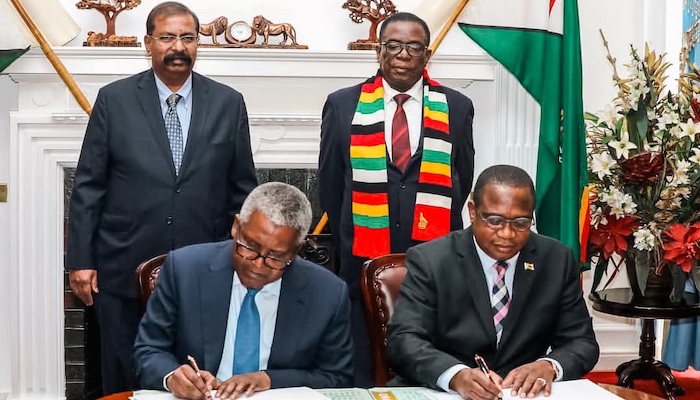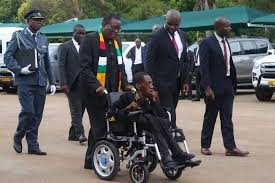Opinion and Analysis
Mnangagwa’s Billion-Dollar Gamble: The Dangote Deal and Zimbabwe’s Struggle for Transparency

By Shelton Muchena, International Investigative Journalist, England
When Zimbabwe’s President Emmerson Mnangagwa signed a one-billion-dollar investment deal with Nigerian billionaire Aliko Dangote on 12 November 2025, the moment was heralded by state broadcasters as a triumph of African cooperation and economic revival. The agreement, which promises investments in petroleum infrastructure, energy generation and cement production, was portrayed as evidence that Zimbabwe is once again open for business.
Yet behind the smiles and handshakes at State House in Harare, questions lingered not only about the content of the deal but about the process through which it was reached. The conspicuous absence of Vice-Presidents Constantino Chiwenga and Kembo Mohadi from the ceremony has raised eyebrows across the political spectrum, fuelling speculation about tensions within the ruling ZANU-PF and the opaque nature of major economic decisions in the country.
According to official statements, the Dangote Group will spearhead a suite of projects designed to revitalise Zimbabwe’s ailing industrial base. These include a new petroleum pipeline linking Beira to Harare, a modern cement manufacturing plant and power-generation ventures aimed at easing the nation’s chronic energy shortages.
Dangote described Zimbabwe as “a sleeping economic giant finally waking up,” praising Mnangagwa’s leadership for “creating a predictable investment climate.” For Mnangagwa, the deal serves as a powerful symbol of progress, reinforcing his government’s claim that “Zimbabwe is open for business” a slogan that has been the cornerstone of his administration since he replaced Robert Mugabe in 2017.
However, optimism has been tempered by scepticism. Many observers recall similar announcements during past administrations that yielded little beyond headlines and ribbon-cuttings. Economists have urged the government to release the full terms of the agreement, arguing that transparency is essential if the public is to have confidence in such a high-value partnership.
The absence of both vice presidents at the signing ceremony immediately drew public attention. In a government known for its strict adherence to protocol, their nonappearance was striking.
Vice-President Chiwenga, the former army general instrumental in Mnangagwa’s rise to power, has long been viewed as a key player in Zimbabwe’s political balance. His absence prompted speculation about rifts within the upper echelons of ZANU-PF, particularly amid whispers that he has grown increasingly frustrated with the president’s inner circle.
Meanwhile, Vice-President Mohadi, who resigned in 2021 following a scandal involving alleged misconduct but was later reinstated, has often been at the centre of corruption allegations. Reports suggesting that figures linked to his network were involved in preliminary negotiations with Dangote’s representatives have heightened suspicion that the deal may not be entirely above board.
A former senior government official, speaking on condition of anonymity, remarked: “When billion-dollar deals are signed without the full executive team present, the optics are troubling. It either signals a lack of trust within the leadership or an intentional effort to keep certain individuals at arm’s length.”
Zimbabwe’s history with large-scale investment deals is chequered. From diamond concessions in Marange to failed energy partnerships in the 2000s, many ventures have been marred by allegations of corruption, mismanagement and political favouritism.
Mnangagwa himself has long sought to distance his presidency from the excesses of the Mugabe era, emphasising reform and economic stability. Yet critics argue that without systemic change, the same patterns of opacity and patronage will persist.
Dr Thokozani Moyo, a Harare-based economist, notes: “This government has mastered the art of the announcement. But in practice, we rarely see follow-through. The key question is not whether Dangote will invest, but how these investments will be monitored and who will benefit from them.”
For Dangote, Africa’s richest man, the decision to invest in Zimbabwe is not without risk. His earlier attempts to enter the market in 2015 stalled amid bureaucratic delays and shifting political winds. Sources close to the Dangote Group suggest that renewed engagement began quietly in 2023, following reassurances from senior Zimbabwean officials about regulatory stability and land access.
In a statement, Dangote described his renewed confidence in the country’s leadership: “We are convinced that the current administration is serious about reform and regional industrial cooperation.”
Analysts, however, caution that corporate diplomacy often serves as a double-edged sword. “Dangote is a shrewd operator,” said South African investment analyst Mpho Ledwaba. “He knows how to navigate complex political environments, but in Zimbabwe’s case, he will need to tread carefully to avoid being drawn into factional politics.”
Zimbabwe’s economic landscape remains precarious. Inflation has stabilised but remains high; foreign currency shortages persist; and public debt continues to mount. Against this backdrop, a billion-dollar deal with one of Africa’s largest conglomerates could indeed offer a lifeline.
Yet such optimism hinges on execution. Without transparency, even the best-intentioned projects risk faltering. “We need parliamentary oversight and public disclosure,” argues opposition legislator Tendai Biti. “Otherwise, this becomes another secretive arrangement that benefits the elite while ordinary Zimbabweans continue to struggle.”
Civil society organisations have echoed these concerns. The Zimbabwe Coalition on Debt and Development (ZIMCODD) has called for the government to publish the memorandum of understanding, warning that “opaque mega-deals have historically drained public resources rather than strengthened them.”
For Mnangagwa, the Dangote agreement is more than an economic opportunity it is a political test. With elections behind him but legitimacy still contested by sections of the opposition and civil society, he must demonstrate that his government can deliver tangible, accountable growth.
By signing the deal without his vice presidents, Mnangagwa may have sought to project decisiveness and personal authority. Yet in doing so, he risks reinforcing the perception that key decisions are concentrated in the hands of a few, rather than conducted through inclusive governance.
A senior political analyst at the University of Zimbabwe summed it up succinctly: “If this deal succeeds, Mnangagwa will claim it as his personal legacy. If it fails, it will confirm what many already suspect that his government operates in the shadows.”
As bulldozers and cement mixers prepare to move, the true test of the Dangote deal lies not in the signing ceremony but in the implementation. Will contracts be transparent? Will local communities benefit? Will employment opportunities be fair and accessible?
If managed properly, the partnership could inject much-needed confidence into Zimbabwe’s economy and re-establish its reputation as a viable destination for African capital. If mishandled, it risks becoming yet another cautionary tale of grand promises and squandered potential.
For now, the deal remains both a symbol of hope and a reminder of Zimbabwe’s enduring struggle with governance and accountability.



